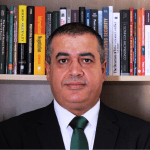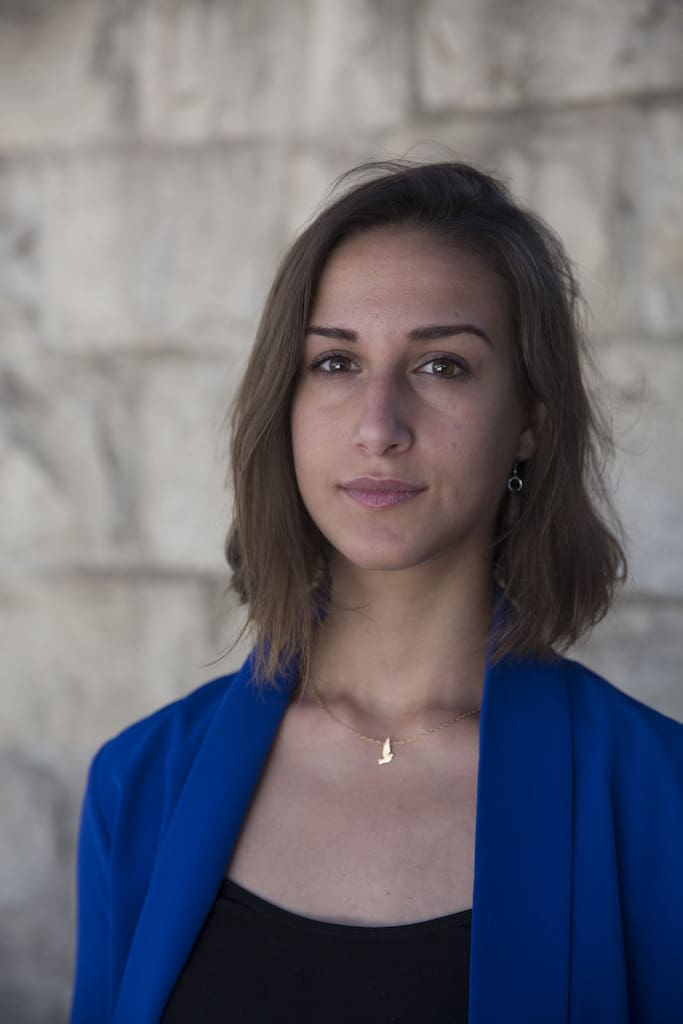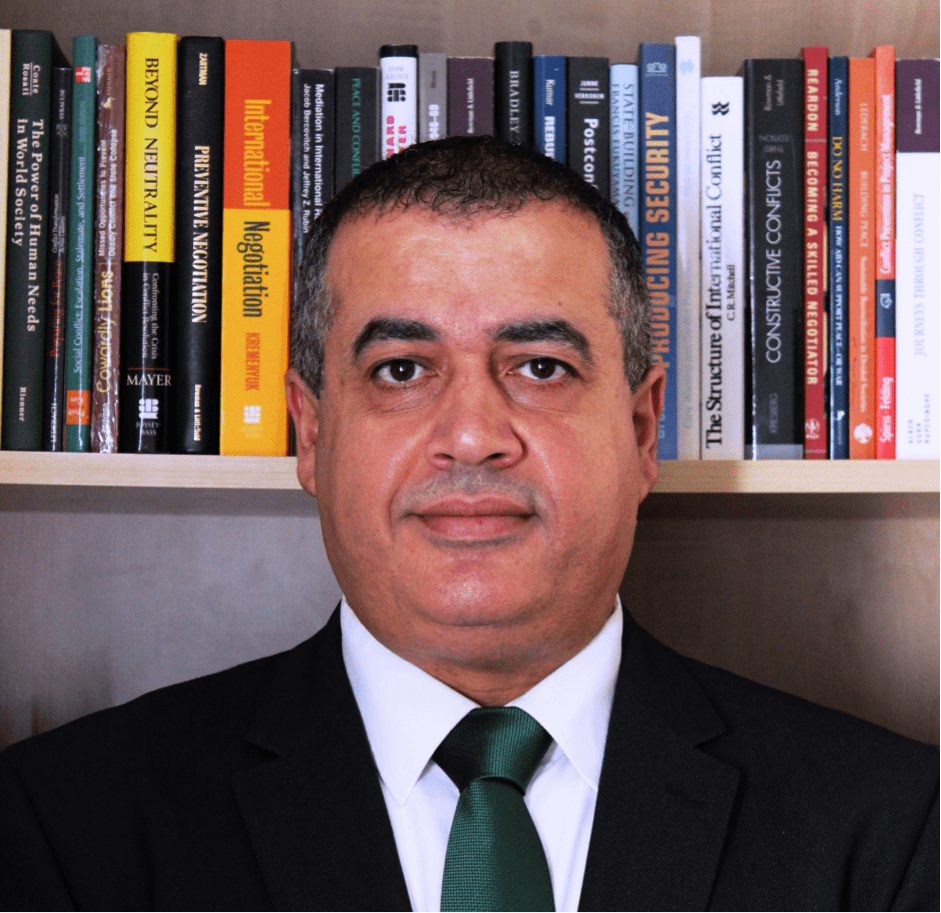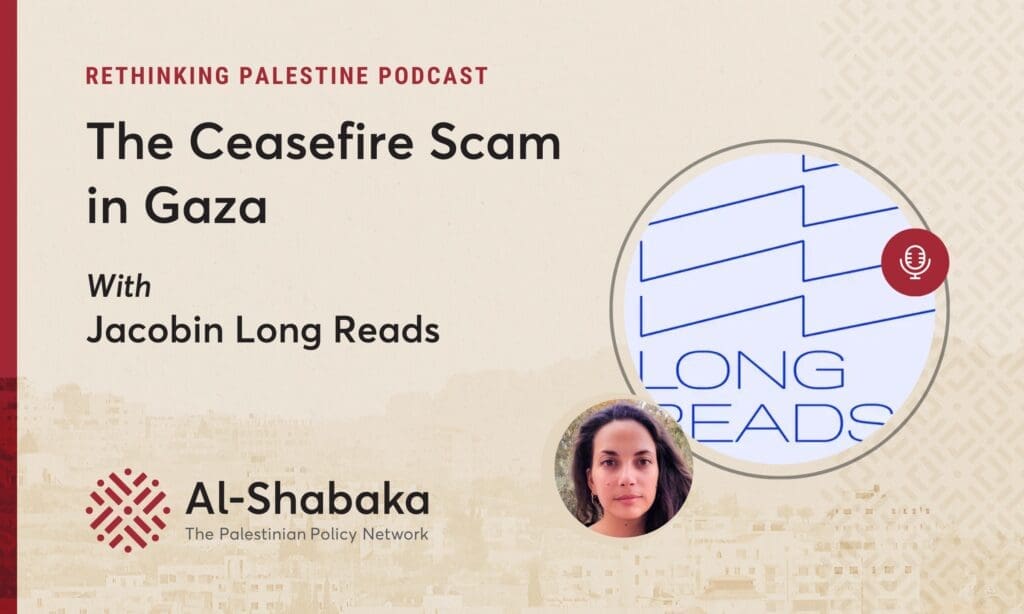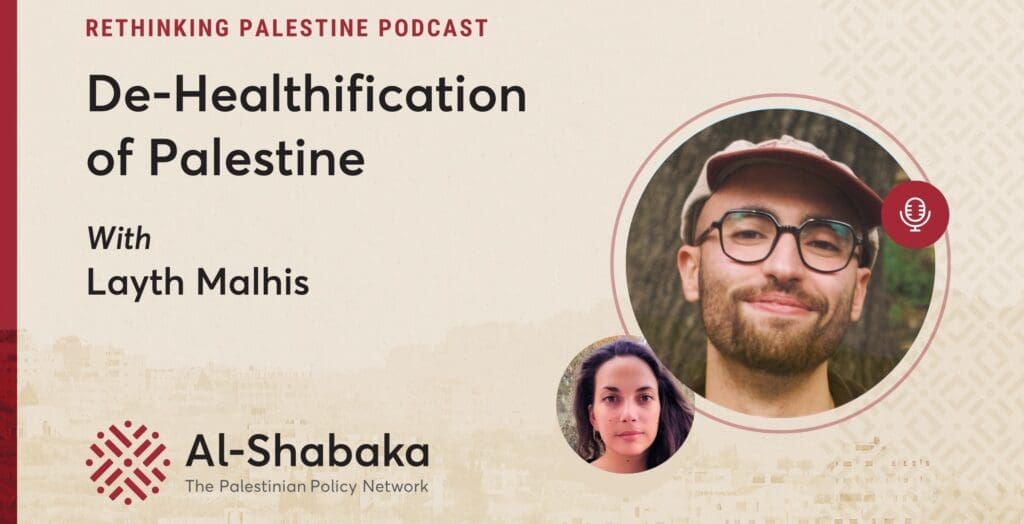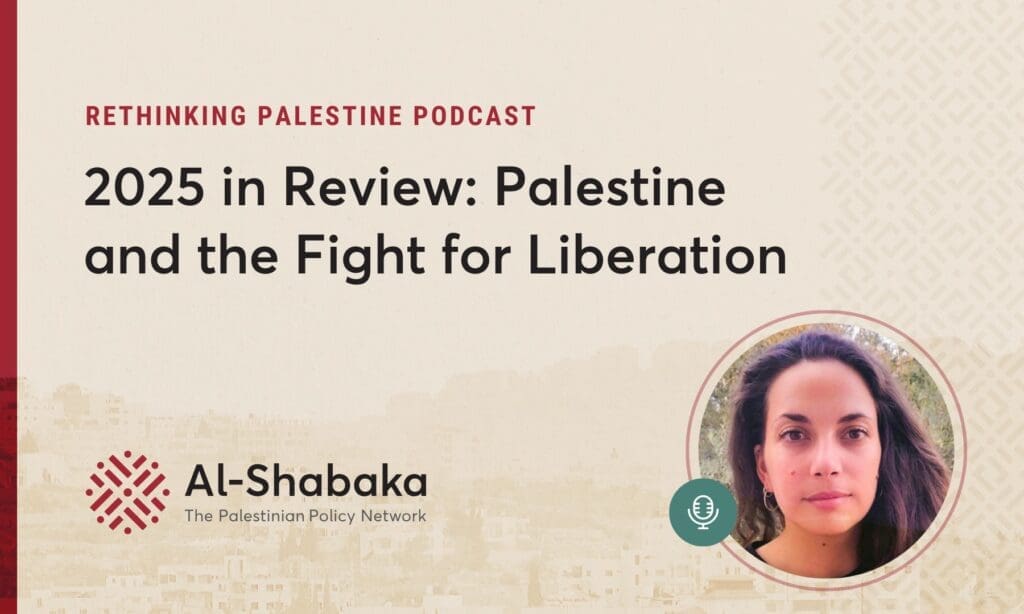About This Episode
Episode Transcript
The transcript below has been lightly edited for brevity and clarity.
Ibrahim Fraihat 0:00
The target is the resistance — the concept of resistance — and the resistance movement in Palestine, trying to manipulate a situation between Hamas and Jihad in Gaza and attack, before the Gaza bombing starts, resistance leaders in Jenin, and then continuing in Nablus, sending the message that everyone is targeted here.
Yara Hawari 0:29
This is Rethinking Palestine, a podcast from Al-Shabaka, the Palestinian Policy Network. We are a virtual think tank that aims to foster public debate on Palestinian human rights and self-determination. We draw upon the vast knowledge and experience of the Palestinian people, whether in Palestine or in exile, to put forward strong and diverse Palestinian policy voices. In this podcast, we will be bringing these voices to you so that you can listen to Palestinians sharing their analysis wherever you are in the world.
At the beginning of August, the Israeli regime launched a new assault on Gaza, killing 44 Palestinians, including at least 16 children, as well as damaging vital infrastructure. This kind of repetitive violence is the cruel reality that Palestinians in Gaza face, not to mention 15 years of a crippling siege which dictates all aspects of life.
Now, once again, we saw many mainstream analysts and media outlets report on the issue without context and nuance, separating Gaza from the rest of Palestine and framing this as the perpetual Israel–Gaza conflict. Indeed, this has long been the goal of the Israeli regime — to siphon off Gaza as something quite different to the rest of Palestine and the Palestinians.
Not only is this an attempt to fragment Palestinians, but also an attempt to obscure the wider picture and political context. Indeed, prior to the assault on Gaza, the Israeli regime army had been invading and raiding the northern West Bank city of Jenin for quite a few months. One such raid saw the murder of veteran journalist Shireen Abu Akleh by Israeli soldiers.
Following the so-called ceasefire between the Israeli regime and Islamic Jihad in Gaza, we also saw the Israeli army raid and invade the old city of Nablus, in which it killed three resistance fighters. All of this is vital context in understanding what the Israeli regime has been doing in recent weeks and why.
This is a two-part episode. Joining us for the first part of this episode of Rethinking Palestine is Dr. Ibrahim Fraihat, Associate Professor in International Conflict Resolution at the Doha Institute for Graduate Studies and Al-Shabaka policy member. Dr. Fraihat, thank you for joining me.
Ibrahim Fraihat 2:53
Thank you, Yara.
Yara Hawari 2:55
We know the kind of violence that the Israeli regime inflicted on Palestinians in Gaza at the beginning of August is cyclical. Indeed, the Israeli regime’s military tactic of “mowing the grass” is well established. But what did it claim was the goal this time?
Ibrahim Fraihat 3:10
Well, the declared goal as we heard from the Israeli government is targeting Islamic Jihad in Gaza and the military capability of the group in Gaza. And in addition, this was justified as preventing an attack, because the Israeli bombing was very unprovoked. There were no attacks or anything coming out from Gaza. But then this was explained by the Israeli government as a preventive action — or preemptive action — against Islamic Jihad, that they were planning a response to the arrest of Islamic Jihad leader in Jenin, Sheikh al-Saadi.
And as we know in international relations, these preemptive strikes are extremely problematic, with very ethical concerns, because they can’t be verified. How can you verify that there was a planned something, or this unfolds under the preemptive action as Israel is trying to explain it? So what we know for sure is that the attack on Gaza and the bombing of Gaza is unprovoked, and Israel launched targeting, particularly Islamic Jihad group, as it was understood.
Yara Hawari 4:25
So as I mentioned, the Israeli regime has long attempted to siphon off Gaza — something socially and politically separate to the rest of Palestine. But of course, for Palestinians, we know that this is not the case. Gaza is a vital part of Palestinian society and struggle. And you’ve written about this in a recent article — you’ve written that the assault on Gaza was actually an extension of what the Israeli regime has been doing in the West Bank city of Jenin. Can you elaborate on this?
Ibrahim Fraihat 4:58
Yes. In fact, there was a war happening in Jenin before we saw the Gaza attacks, and that was taking place for at least the past year.
Why didn’t we hear much about it? It was because of a shift in strategy — military strategy — that Israel targeted Jenin during the past year. And this strategy was to shift from large-scale operations to attack resistance groups in Jenin — like Islamic Jihad, Fatah, and other groups — to targeted killing, or extrajudicial killing assassinations, in Jenin.
Why was the shift from large-scale operations to this kind of targeted assassinations and extrajudicial killing? It was because large-scale operations attract the attention of the international community and they draw a lot of attention and criticism against Israel. And most importantly, at the moment, the Biden administration’s strategy focuses on keeping the Israeli-Palestinian conflict under control. The entire Biden administration’s focus is currently on Ukraine and challenging Russia in Ukraine, and to a certain extent also China. Any escalation in the Israeli-Palestinian conflict will go against the strategy of Joe Biden and the US administration and how they’re managing the global stage.
So large-scale operations, as we saw in the past — in 2002, there was a large-scale operation against the Jenin refugee camp and it drew a lot of criticism against Israel and how it handled it, and it was not received well at all among the international community. So given the global context at the moment, at least since the arrival of the Biden administration and the message that he made clear — that he wants a quiet Israel-Palestine and does not want to be distracted from Russia and China — for that reason, Israel adapted its strategy to avoid large-scale operations in Jenin and focused on extrajudicial killing.
And we saw this happening in a number of raids in Jenin, where they assassinated resistance figures in the Jenin refugee camp and other places in Ya’bad and in other towns around Jenin. All put together, this presents a pattern of the strategy that Israel was using. But this by no means — for the past year, Jenin was not silent. And also, of course, there were responses from Jenin. So it was a war happening, but in single incidents here and there, lacking the international community’s attention. And for that, we did not hear much about it, because it lacked continuity in terms of large-scale operations happening for many days continuously.
But then what we saw in Gaza was an extension of this war from Jenin to Gaza. And here there are links to Islamic Jihad in particular, because Israel could not keep this under control by targeting only certain individuals from the resistance movement in Jenin.
Yara Hawari 8:24
And I suppose this extrajudicial killing of resistance leader figures was then extended after the assault on Gaza to Nablus, where the Israeli regime raided the old city of Nablus and assassinated three resistance fighters there, including Ibrahim al-Nabulsi, also known as the Lion of Nablus. So what you are saying — what you’re arguing — is that this is all linked and part of the same effort to quell Palestinian resistance during this period?
Ibrahim Fraihat 8:55
That’s an excellent question, Yara. And here, in order to read this strategy, we really have to look at the targets that Israel is attacking. By no means, as Israel declared that they’re targeting Islamic Jihad — that the target was only Islamic Jihad. Ibrahim al-Nabulsi in Nablus was an extension of the Gaza bombing. Ibrahim al-Nabulsi was a Fatah leader from Kataeb Shuhada’ al-Aqsa — the Al-Aqsa Brigades — and Fatah is the ruling party in Palestine, led by Mahmoud Abbas. It’s the party that’s engaging in negotiations since 1993, since the Oslo Accords. But nevertheless, that did not exempt them from being targeted in the assassinations in Nablus — and not only in Nablus, but also in Jenin.
So who was fighting in Jenin? It was mainly the Fatah Al-Aqsa Brigades taking the lead in Jenin camp, and also Islamic Jihad was taking a leading role there. So it wasn’t only about Islamic Jihad — it was about the military wings of the Fatah ruling party in Palestine that were attacked in Jenin and also later on in Nablus.
This leads us to when we put the puzzle together of trying to figure out what Israel wants. Israel is not targeting a certain group. And we have seen also this in Gaza, when they say that Hamas is not part of this. But the target here is the Palestinian resistance — the Palestinian resistance in general, including those military brigades of the ruling party, Fatah, that is negotiating with Israel.
And another indication of how the target is the resistance — the concept of resistance — and the resistance movement itself: for the first time, we are seeing that Israel is declaring, in a number of statements, and through a third party as well, when they started bombing Gaza, that Hamas is not targeted, or Hamas will not be bombed in Gaza. And here we see the reason — that the target is the resistance movement itself, where they’re trying to create a gap between Islamic Jihad and Hamas and Fatah in Gaza while targeting one group.
And this actually led to some sort of tension between Islamic Jihad and Hamas on that level, because we have seen that Israel is bombing Islamic Jihad and Hamas is not joining the resistance against Israel. Hamas is being led by its own calculations. They’re in the government, they have responsibilities toward the Gazans and the governance in general — water, security, jobs, and all of that. And Israel succeeded, to a certain extent, to alienate Hamas and target only Islamic Jihad, which again touches on that same exact point that you raised about the target is the resistance, the concept of resistance, and the resistance movement in Palestine — trying to manipulate a situation between Hamas and Jihad in Gaza, and attack, before the Gaza bombing starts, Fatah resistance leaders in Jenin, and then continuing in Nablus, sending the message that everyone is targeted here. There is no resistance that belongs to this party or that party, but all Palestinians are a target.
Yara Hawari 12:33
That’s an incredibly important point — that we can’t simply boil this down to the Israeli regime targeting Islamists, but actually targeting armed Palestinian resistance as a whole. And another important point you mentioned was that this again follows along Israel’s policy of creating or entrenching further divisions between various Palestinian political factions. And I think we saw that play out very well in its latest assault on Gaza.
Now, if we dwell on Islamic Jihad just for a minute — because of the so-called links with Iran and Hezbollah, some analysts are actually also connecting this latest assault to the Israeli regime’s attempt to control the Karish gas field, which is located in Lebanese waters. What can you tell us about this?
Ibrahim Fraihat 13:23
Thank you. This is an important question. We cannot understand any particular conflict without looking at the regional and global context of it. And we’ve seen how the global context of the Biden administration’s strategy affects the Israeli military strategy in Jenin — of shifting to targeted killing rather than large-scale operations.
Here also, where targeting Islamic Jihad is linked to the regional context and the relationship with Iran. We know Islamic Jihad has strong ties with Iran. It’s supported by Iran historically. So there is no secret about this. And we know at the same time that there are nuclear negotiations between Iran and the United States taking place in Vienna — the Vienna nuclear talks, as we know it. And we also know the timing — that for the first time since the arrival of the Biden administration, Iran and the US are getting the closest ever to reaching an agreement over Iran’s nuclear activities. And Israel has openly rejected any talks or an agreement with Iran on that level and called for the bombing of Iranian targets.
So the timing — that this is happening now while they’re trying to close a deal in the Vienna talks between Iran and the United States — this is raising important questions that this is also a response to Iran and the opposition of the Israeli government to the Vienna nuclear talks, and trying to disrupt it in some way by targeting Iran’s proxies or Iran’s allies like Islamic Jihad in Palestine.
And what makes this analysis also important, in my view, is that when we look at the overall Israeli strategy of countering Iran, for the past at least 10 years, Israel has been attacking Iranian targets in Syria and also extended to attacking Iranian targets in Iraq. So if they’re doing it in Syria and if they’re doing it in Iraq, then why not also attack what they see as an Iranian ally in Gaza? So better start with Gaza instead of going to Iraq and Syria. So there is also a dimension — the regional context of it — linked to the overall strategy with Iran.
And as you also said, related to the timing is the control of the Karish gas field in the Mediterranean, and how this has been taking place between Israel, Lebanon, and the number of statements that Hezbollah has made also openly over trying to stand up against Israel on the gas field, and also making statements that they will respond. So for that also, Israel is linking Islamic Jihad to Hezbollah statements, to the Karish gas field, to Iran — all starting with Islamic Jihad in Gaza and sending that message that we can respond to Iran, to Hezbollah, and to the overall strategy of countering Iran, and this time starting with Gaza.
Yara Hawari 16:46
Thank you for that. I think this conversation has really highlighted that Israeli regime violence is always ongoing, and it’s always usually part of this wider strategy to quell Palestinian resistance. But also we have to think regionally about how this relates to the Israeli regime’s neighbors and its maneuverings in the Middle East region and in the wider Mediterranean region.
I think we’ll end there. So thank you so much for joining me on this episode of Rethinking Palestine.
Ibrahim Fraihat 17:14
Thank you, Yara, and thanks to Al-Shabaka for all the great work that they’re doing. Keep up the great work.
Yara Hawari 17:20
If you are enjoying this podcast, please visit our website, al-shabaka.org, where you’ll find more Palestinian policy analysis, and where you can join our mailing list and donate to support our work.
Joining me for the second part of this episode is Mariam Barghouti, writer, senior Palestine correspondent for Mondoweiss, and Al-Shabaka policy member. Mariam, thank you for joining me.
Mariam Barghouti 17:47
Thank you for having me.
Yara Hawari 17:49
Now, we heard from our previous guest about how the assault on Gaza was linked to the military assaults and raids on Jenin that have been happening for months and how it’s also all connected to a wider regional dynamic.
I want to hone in on what’s been happening on the ground a bit more. Mariam, since the assassination of Ibrahim al-Nabulsi, a renowned resistance fighter, you have been in Nablus reporting on the aftermath of what the Israeli regime has dubbed Operation Break the Wave. Can you tell me a bit about what you have seen?
Mariam Barghouti 18:19
So what Israel is kind of doing in terms of trying to crack down on Palestinian resistance in all its shapes and forms — even to the point of just the imagination of liberation. But in places like Nablus and Jenin, what you witness is this constant confrontation, specifically with the Israeli military. So these are areas that aren’t just purely surrounded by settlers or settlements. The exposure of the colonial project is through the lens of this brute military force.
So what we’re seeing is this continued growth of Palestinian resistance in different forms and manifestations that are in accordance with the current generation, right? So the generation of today will not fight the same way that generations in the past have fought. But nonetheless, what I’m witnessing, at least in Nablus, is there’s this tendency to also confront and fight back in a very visible way. So people like Ibrahim al-Nabulsi, who didn’t even make it to his 19th birthday, was walking around with the rifle on his back. Very proud. And it’s as though he was bearing a responsibility. But it’s also very telling of how, whether you are known publicly or unknown, you are targeted. So there’s no point in even trying to really go underground. On the contrary, the point is to showcase that if this colonization continues as it is, then it will be met by Palestinian resistance. In the end, who wants to live an undignified life, especially a younger generation that has been exposed to different realities around the world in light of increased communication with technology development?
Yara Hawari
A lot of people might not have heard of Ibrahim al-Nabulsi before last week. I was wondering if you could tell us a bit more about him and why it was so important or significant for the Israeli regime to assassinate a 19-year-old.
Mariam Barghouti
I’m really glad you brought that to light — the fact that he wasn’t really known until the targeted assassination attempts that have increased in the past couple of months. So targeting Ibrahim al-Nabulsi, who is a resistance fighter reported to be part of Al-Aqsa Martyrs Brigades, which is the armed wing of Fatah, became known as this confrontational resistance fighter, especially to the Palestinian residents in the old city.
But al-Nabulsi’s story kind of goes further back in the timeline of contemporary history. So in March and April, Israel officially declared there was this escalation of Operation Break the Wave. And that means Israel will continue intensifying its provocative military raids and invasions on Palestinian cities in order to also push resistance fighters further out so that they can target them and assassinate them. And this will be part of the escalation dominance, which is a military strategy.
Operation Break the Wave was noted by Israeli ministers and officials as one which will be hundreds of operations across Palestine. So what we saw in Gaza in the first week of August, between the 5th and the 7th, is part of Operation Break the Wave, which was technically meant to target resistance in the West Bank. So we saw Gaza becoming the battleground for a dynamic in the West Bank, and it shows you how the Israeli military and settlers are trying to constantly provoke Palestinians, despite being a nuclear regime and a nuclear power.
And al-Nabulsi, who has grown up under the brutality of a military siege — this is a kid that was born in 2003, peak curfew hours, where no one was allowed to leave their home. The Israeli military demolished parts of the old city in Nablus in ways that are so savage and brutal that they’re even destroying historical artifacts across the city, to kind of completely erase any existence of not just Palestinians — any other reality or community that is not the current Israeli one that’s still being constructed and built.
Ibrahim, at 16, became involved in a confrontation with Israeli settlers. First, it was Israeli settlers a few years ago that began raiding Joseph’s Tomb and Joseph’s Well near the old city. And as a child where your entire childhood is kind of under the mercy of an army and settlers that show and have no mercy whatsoever, means that you will necessarily come to a recognition that, “OK, I need to do something.”
So as the confrontation of youth increased towards the settlers that were raiding the city, the presence of settlers actually decreased. And I think this is part of why he also became a target — that there was an effectiveness to the confrontation of Palestinian resistance. If it’s not at the level that is required in terms of liberation, but there was effectiveness and we really can’t take away from that either.
And this is what made him a target, along with his comrades. Starting the assassination trend back on February 8th, when Ashraf al-Mubasalat, Adham Mabrouk, and Mohammed al-Dakhil were killed in extrajudicial assassination. And these were all comrades of al-Nabulsi. So if he’s only witnessing brutality as a child, and then the targeted assassination of his comrades — who were the sole reason that that city saw any inkling of protection against the military — then naturally he’s also going to be emboldened and showcase his face, right?
And I think that’s what triggered also the Israeli military commanders to focus on him, because he was so loved in his community, he was so kind. And he didn’t do it — from what I gathered, at least from the testimonies of people there — he didn’t do it for the fame. He did it for the necessity, for the need of it. And I think that was something that was very respected.
And what Israel will do is it will constantly not just kill resistance fighters, but any symbol of resistance. And we see that in the way they also target cultural spaces, in the way that they target poets like Dareen Tatour, in the way that they target journalists as well, constantly. And in the way they’re trying to criminalize, for example, six Palestinian civil society organizations whose primary mission is to document Israeli violations.
So it’s kind of a trend that folds into itself. And al-Nabulsi — again, didn’t make it to 19 — was so aware of these dynamics. Just because someone isn’t naming it through the language that we understand in policy, but they inherently know that this is systemic structural oppression, and that they also have the right to say no and to act on that right. And I think this is what made him a target, essentially.
Yara Hawari 25:47
Mariam, you really clearly described the context of all of these Israeli regime maneuvers and also outlined very beautifully the story of Ibrahim al-Nabulsi. I just want to take us back for a moment, because you mentioned the Israeli military tactic of escalation dominance. I was wondering if you could explain what that is for our listeners.
Mariam Barghouti 26:10
So there’s this military strategy that was kind of developed first by the US, and it’s called escalation dominance. And what that means is that as a military power, you provoke an escalation or an escalatory response by intensifying your assault and your attack on a group, with the knowledge that a response from the opposing actors will place them at a disadvantage. So it’s actively, kind of provocatively, pushing Palestinian resistance and pushing Palestinian lives to the limit of recognizing that this is not a way to live. You cannot live under these realities and dynamics. So they heighten it gradually.
And it’s part of this shock and awe doctrine that was explained very beautifully and well by Naomi Klein, another also award-winning journalist who delved into the way this is used, especially in capitalist systems, in order to continue the market trade. And let’s not forget that Israel relies heavily on exporting as well as importing weapons that it tests on Palestinians first as lab rats.
So what they do is they ensure their dominance in the equation and they push for escalatory behavior. And that is de facto seeking the killing of an entire population by recognizing the disadvantages that we’re at. Ibrahim al-Nabulsi fought back with a rifle — a very outdated rifle — against one of the most technologically advanced militaries in the world. When Israel raids Palestinian towns and villages, the youth often respond with stones and Molotov cocktails. So to ensure dominance is to also consistently drain and shock Palestinian communities.
And this is not just on Israel or the Israeli regime. This is on the entire international community that is complicit, and we need to look at them as accomplices. The US is an accomplice, especially considering that Biden, for example, came to visit Palestine in July, and this is after the declaration of Operation Break the Wave — which means he was briefed and informed, if not him, then the other delegations that came from the State Department.
So you can tell that what Israel is doing is basically burying Palestinians and making Palestinians dig their own grave so that it can illustrate itself as triumphant, or illustrate itself as it’s fighting a terror cell or a terror organization. This very ambiguous term has lost its meaning. Israel has been terrorizing Palestinian children, youth, and adults for decades now. I think it’s an organized terrorist party or association at a collective level, including its courts.
Yara Hawari 29:10
Mariam, where do you think Palestinians are now, following this assault on Gaza and these extrajudicial killings of resistance fighters?
Mariam Barghouti 29:18
I think that generally, Palestinians are tense. I think we’re also terribly afraid, but also very empowered in recognizing that despite the constant attempts by the Israeli regime to bring down the Palestinian spirit and yearning to be liberated, it still persists.
In terms of Gaza, there needs to be an immediate breaking of the siege — that should have happened 15 years ago when it was first started, right? And I think what we’re recognizing now, and it’s something actually that I believe was miscalculated, thankfully, by the Israeli regime, is that rather than being divided, Palestinians are being unified. So now you can hear Gaza, for example, speak about the fate of the West Bank. The West Bank speaks about and fights for the fate of Gaza. The same thing with historic Palestine — Palestinians that have been marginalized, and those that have been treated as second- and third-class citizens by the design of the system, are also reclaiming the right to be Palestinian and to live in historic Palestine as Palestinians.
But more than this is what I’m also noticing — that as long as there’s a single Palestinian breath, resistance will rise. For example, in the West Bank, one of Israel’s rules during Oslo was to demilitarize the West Bank. The only people that were left with arms are those from the Palestinian Authority’s security forces, who are also recognizing an increasingly authoritarian regime — that de facto no Palestinian authority, whether the PNA or otherwise, can function and operate with the Israeli colonial power over its head.
So what we’re realizing is that the arms are also changing function. That what was meant to hush the Palestinian Authority is now turning against them, because in the end, the new generation of Ibrahim al-Nabulsi, the new generation of Wasim Abu Khalifa, who was assassinated yesterday also in Nablus, whose father was an officer in the Palestinian Authority — they don’t know the history of the Oslo generation. These are people that grew up in the 2000s, and in 2003 when the apartheid wall was being built and is now almost complete. So it means nothing to them — any of the agreements that were done before. What means something is the reality on the ground. And the reality on the ground dictates that if you want to live a dignified life, then the Israeli regime must go, period.
You cannot live under apartheid. You cannot live under repression and a population that is no longer saying “death to Arabs” but actively intensifying that as practice. 2022, and we’re not even done with the year, has shown more than five times the killings by Israel than we saw in the same time period last year, when Palestinians were being chased in Lyd and in Haifa and in Yaffa with butcher knives by settlers chanting “death to Arabs.”
So I think what we’re seeing is fear — but that’s because we’re perpetually terrorized by this regime — but also resilience, unity, and defiance. And Gen Z really understands the value of being able to live life, not to just hope for it and wish that, “Oh, maybe in my fifties we’ll be free.” No, the question being posed now is: why on earth are my teen years not free? Why on earth is my childhood not free, or my adult life? And I think that’s what’s being pursued very actively and visibly.
Yara Hawari 33:07
Thank you, Mariam, for that. I think we will have to leave it here, but thank you again so much for joining me on this episode of Rethinking Palestine.
Mariam Barghouti 33:15
Thank you so much.
Yara Hawari 33:19
Thank you for listening to Rethinking Palestine. Don’t forget to subscribe and leave us a review. For more policy analysis and to donate to support our work, please visit our website, al-shabaka.org. You can also follow us on Facebook and Twitter.
Mariam Barghouti is a Palestinian writer and researcher based in Ramallah. She earned a BA in English Language and Literature from Birzeit University, and an MSc in Sociology and Global Change from the University of Edinburgh. She worked as a journalist and reporter with a focus on the Levant, and published various sociopolitical commentaries from Palestine. She has undertaken monitoring and evaluation missions of humanitarian and development aid in Jordan, Palestine, and Lebanon for various governmental and non-governmental organizations. Her reporting and analysis have been featured in Al-Jazeera English, the New York Times, the Guardian, BBC, and Middle East Eye, amongst others.
Al-Shabaka Member Ibrahim Fraihat is a professor of international conflict resolution at the Doha Institute for Graduate Studies, and Affiliate Scholar at Georgetown University. He previously served as Senior Foreign Policy Fellow at the Brookings Institution, and taught international conflict resolution at George Washington University and George Mason University. His latest book is Unfinished Revolutions: Yemen, Libya, and Tunisia after the Arab Spring (Yale University Press, 2016). He is the recipient of George Mason University’s Distinguished Alumni Award (2014) for his achievements in the field of conflict resolution. Fraihat can be followed on Twitter @i_farihat.
Al-Shabaka: The Palestinian Policy Network is an independent, non-partisan, and non-profit organization whose mission is to convene a multidisciplinary, global network of Palestinian analysts to produce critical policy analysis and collectively imagine a new policymaking paradigm for Palestine and Palestinians worldwide.










